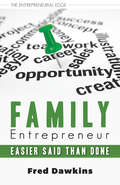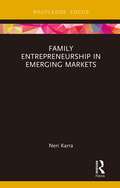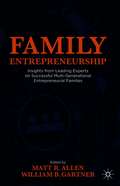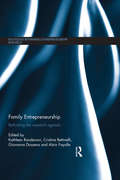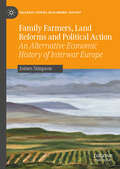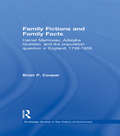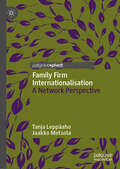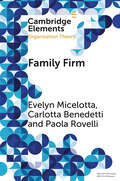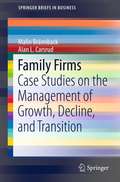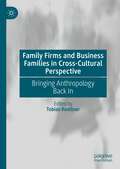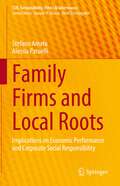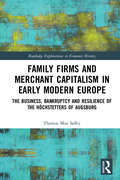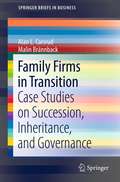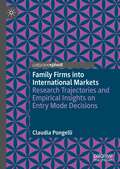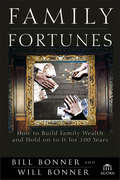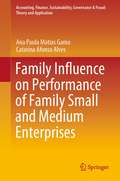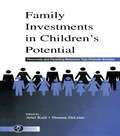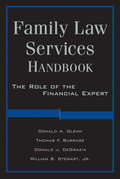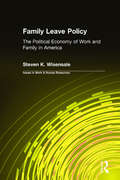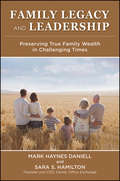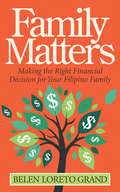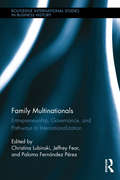- Table View
- List View
Family Entrepreneur: Easier Said Than Done
by Fred DawkinsA course in family-business entrepreneurship, taught through a narrative about four frustrated people taking a seminar that changes their lives. Limited time offer. In the second book in the Entrepreneurial Edge series, frustrated individuals, immersed in family businesses, enroll in a two-week course on entrepreneurship that will change their lives. For ten years Mary has been an office manager at her brother’s business only to see her younger brother join the company and receive shares while she gets none. Plagued by doubts about her ability to change the culture in the family business or succeed outside it, Mary signs up for a seminar series on family entrepreneurship. A crusty mentor named Sam conducts the seminars in a class that includes three others: a son considering taking over a family business, the owner of a successful company involving her two daughters, and a man with a stormy working relationship with his sister. The narrative brings us right into the class as Sam cleverly leads all of us to decisions about our future. Anyone interested in entrepreneurship, starting a business, or just managing their career will benefit from the shared experiences of this compelling story. Watch for Ageless Entrepreneur, arriving May 2015.
Family Entrepreneurship in Emerging Markets
by Neri KarraIn this fascinating study, Neri Karra examines entrepreneurial family businesses in emerging markets by integrating three schools of thought: agency theory, an institutional framework, and the altruism perspective. Providing an in-depth treatment of the area as well as a real-life case study, it provides a theoretical perspective as well as qualitative insights. It also offers practical observations and future research implications. This book will be valuable reading to students and researchers of entrepreneurship, family businesses, and altruism in management.
Family Entrepreneurship: Insights from Leading Experts on Successful Multi-Generational Entrepreneurial Families
by William B. Gartner Matt R. AllenThis book provides recent ideas, insights, facts, evidence, frameworks, and perspectives on how and why entrepreneurial families are successful over generations. The book focuses on how families successfully implement entrepreneurship across generations. That success, it argues, requires entrepreneurship at the level of the family, not only in the businesses the family owns and manages. Written by noted academics and consultants who are authorities on family entrepreneurship, the chapters provide a comprehensive exploration of the characteristics of successful entrepreneurial families, their motivations, how they behave over time, and, suggestions for how business families can encourage and sustain entrepreneurship. This comprehensive look at family entrepreneurship will serve as a fundamental reference text for family business consultants, owners, and scholars.
Family Entrepreneurship: Rethinking the research agenda (Routledge Rethinking Entrepreneurship Research #Vol. 44)
by Alain Fayolle Cristina Bettinelli Kathleen Randerson Giovanna DossenaFamily business is the most prominent form of business organization, and its importance to the global economy cannot be under-estimated. Until recently, the impact of the family on entrepreneurial firms has been under-researched, leading to a conceptual gap between the two areas of study, and an underestimation of the contribution of family systems to entrepreneurial success. Starting from the consideration that family is an intimate and essential aspect of entrepreneurship, this book considers connections between family, family members, entrepreneurial behavior, family business, society and the economy. Bringing together a unique range of international contributions, it offers new theoretical perspectives and empirical insights as well as an in-depth consideration of the diversity of contexts and processes associated with entrepreneurship in family settings. Above all, this book opens up a comprehensive research agenda on the linkages between family, family firms and entrepreneurship and will be of interest to researchers, educators and advanced students of entrepreneurship, small firms and family business.
Family Farmers, Land Reforms and Political Action: An Alternative Economic History of Interwar Europe (Palgrave Studies in Economic History)
by James SimpsonThis book examines how European farmers responded to the economic and political challenges created by the First World War and the Great Depression. The difficulties of interwar Europe have been frequently explored, but rarely from the perspective of the agricultural sector, where two-fifths of the population earned their livelihood, mostly as small, family farmers. The traditional literature argues that the landed elites conspired to undermine many of Europe's young democracies after the Great War. This book shows instead that by the early 1920s most had either sold their land or seen it confiscated following the widespread land reforms of Eastern Europe, leaving the family farm as the dominant unit of production. The book advances several theories that place the family farmer at the heart of change and explores why some proved to be enthusiastic supporters of liberal democracy, while others preferred political ideologies as diverse as social democracy in Scandinavia or fascism in Germany and Italy. It explores the nuanced and evolving links between family farms and government interests, showing how this relationship varied in different countries and contexts across Western and Central Europe. The book discusses the impact of family farms on agricultural market trends, the influence of collective action on government policies, and the increasing politicization of farmers and rural populations more broadly. The book also sheds light on how agrarian problems and their solutions differed in industrial, agrarian, and transforming societies in interwar Europe. This book will be an illuminating read for scholars of economic history, comparative history and European history interested in agriculture and rural communities.
Family Feud: Andersen vs. Andersen (A)
by Ashish Nanda Scot LandryTraces the history and development of consulting within Andersen and the history of the schism between Arthur Andersen and Andersen Consulting. Ends with the two units seeking external arbitration of their dispute.
Family Fictions and Family Facts: Harriet Martineau, Adolphe Quetelet and the Population Question in England 1798-1859 (Routledge Studies in the History of Economics)
by Brian CooperClassical political economy rests on the assumption that the market and the family are overlapping and mutually dependent realms, dominated in turn by economic men and domestic women. Here, Brian Cooper explores the role of economic theory in 'normalizing' the family in the first half of the nineteenth century. Drawing on a wide range of sources - novels, books on etiquette and statistical sources, as well as works of economics - the book examines the impacts of these different forms on contemporary debate and will be of interest to historians of economic thought, feminist economics and those interested in rhetoric and economics.
Family Firm Internationalisation: A Network Perspective
by Tanja Leppäaho Jaakko MetsolaDrawing on a series of case studies from Finland, this book examines the role of networking in the internationalisation process of family firms. Providing a comprehensive overview of recent literature alongside the empirical analysis of 24 family firms, the authors use theoretical concepts from family business research to create a model specifically for the internationalisation and networking of family firms. An insightful read for those interested in international and small business, this book offers practical implications for the successful internationalisation of family firms and sets the agenda for future research in the field of family business.
Family Firm: A Distinctive Form of Organization (Elements in Organization Theory)
by Evelyn Micelotta Carlotta Benedetti Paola RovelliThis Element reinvigorates calls to explore avenues to further integrate the research fields of Organization Theory (OT) and Family Business (FB). It presents the family business literature in management journals and categorizes these papers based on four types of theoretical contribution: Embedded, Integrative, Challenger and Generalized. It discusses opportunities for dialogue between FB and OT for each type in three research domains: (i) managing hybridity, (ii) mastering tensions, dualities, and paradoxes, and (iii) modelling time and temporality.
Family Firms
by Alan L. Carsrud Malin BrännbackThis is the third in a series of casebooks on issues faced by families owning and managing a business. This volume focuses on the management of growth, decline, and transition in such firms. These cases are clustered together because family firms grow, decline, and grow again, often transforming themselves several times in the course of their existence, as they face succession issues, financial constraints, and changes in market demand. Managing change also has significant impact on the firm-owning families and their individual members, especially when making decisions under conditions of uncertainty. The eight cases presented in this volume, as those in the previous two casebooks, were developed as a response to the lack of a diversity and selection of cases on family business. The cases emerged by engaging students to help develop them as a part of the curriculum for teaching family business to both graduate and undergraduate business school students in the United States, Canada, Australia, and Finland. However, their utility goes beyond the classroom and should be informative to consultants to family firms and family business owners and members as well.
Family Firms and Business Families in Cross-Cultural Perspective: Bringing Anthropology Back In
by Tobias KoellnerThis edited volume provides an anthropological study of family businesses and business families. In previous research on family firms and business families, the comparative cross-cultural approach of anthropology has so far received little attention. As a result, family firms and business families are too often analyzed without considering cultural and kinship differences adequately. Similarly, although the topics of kinship and the economy are central to anthropological analysis, research on family firms and business families has been a marginal topic only that lacks in-depth discussions within anthropology. This volume breaks the mold by offering new empirical and theoretical insights into discussion about business families and family firms from a comparative cross-cultural perspective. It first addresses how the business family can be defined in different cultures and how kinship becomes understandable as a process and through ‘doing family’. In this, the book provides a systematic comparison of the connections between family, kinship and economic activity in different cultures, whereas many of the previous studies have concentrated on only one or a few regions or cultures. It also shows the complexities and challenges when grounding the analysis of economic activity and entrepreneurship in cultural context.
Family Firms and Local Roots: Implications on Economic Performance and Corporate Social Responsibility (CSR, Sustainability, Ethics & Governance)
by Stefano Amato Alessia PatuelliThis book pursues an interdisciplinary approach to studying family firms as a particular type of business strongly embedded in the territories in which they are located. Featuring an in-depth analysis of original research, the book employs both theoretical and empirical approaches to explore family firms and their relationships with their home territories. The book shows that family firms have unique bonds with their local areas, and these bonds profoundly shape their decision-making and outcomes.The book addresses two research questions, namely, how the connections between family firms and their home territories originate and develop, and how they influence firms’ economic performance and their corporate social responsibility initiatives. Uniquely, it seeks to develop an integrated framework that brings together family firms, local contexts, and places while also presenting new empirical evidence of relevance to scholars, managers, and policymakers alike. In addition, the book responds to the need for a greater understanding of what anchors entrepreneurial families to their home territories and the conditioning effect of local roots on such firms’ behavior.
Family Firms and Merchant Capitalism in Early Modern Europe: The Business, Bankruptcy and Resilience of the Höchstetters of Augsburg (Routledge Explorations in Economic History)
by Thomas Max SafleyThis fascinating study follows the fortunes of the Höchstetter family, merchant-manufacturers and financiers of Augsburg, Germany, in the late-fifteenth and early-sixteenth centuries, and sheds light on the economic and social history of failure and resilience in early modern Europe. Carefully tracing the chronology of the family’s rise, fall and transformation, it moves from the micro- to the macro-level, making comparisons with other mercantile families of the time to draw conclusions and suggest insights into such issues as social mobility, capitalist organization, business techniques, market practices and economic institutions. The result is a microhistory that offers macro-conclusions about the lived experience of early capitalism and capitalistic practices. This book will be valuable reading for advanced students and researchers of economic, financial and business history, legal history and early modern European history.
Family Firms in Latin America
by Ram Subramanian Allan Discua Cruz Claudio G. Müller Isabel C. BoteroThis is one of the first books of its kind to highlight family firms in a Latin American context, helping students to understand the distinctive nature and challenges of Latin American family businesses and how these issues compare to family businesses around the world. Building on their experience in teaching, research, speaking, and consulting on the subject of family firms in Latin America, the editors explain the need to implement and adapt traditional frameworks in the changing Latin American reality. Each section provides background on the most important topics in the management of family firms, including strategy, entrepreneurship, and performance, followed by illustrative cases and a discussion of how this knowledge is similar to or different from other parts of the world. The book’s clear writing and in-depth approach will appeal to undergraduate and graduate students of international business, business in Latin America, and family business.
Family Firms in Transition
by Alan L. Carsrud Malin BrännbackMany of the challenges faced by family-owned businesses develop after the firm has reached a stage of maturity, when the first generation is faced with issues concerning the role of their children in the business and the long-term future of the enterprise. This collection of case studies from around the world demonstrates how governance of both the business and the family (or lack thereof) impacts succession of leadership in the firm and the inheritance of ownership and wealth. It is the role of governance and how it impacts both family and firm that link these family business cases together with succession and inheritance. These topics have been clustered together because the social systems of the family and the management system of the firm have significant impacts on the success, or failure, of succession plans. All the planning in the world for succession and inheritance will not succeed if the firm does not have a well established and functional governance system. Likewise, if the family does not understand its role in the governance of the firm and the mechanisms for making sound decisions, succession choices may not be accepted by family members. Most family firms fail because of succession issues, not economic ones. This volume features nine in-depth cases of family-owned business from a variety of industries to illuminate the dynamics of governance, succession, and inheritance. Each case illustrates the complexity of issues and, through interactive exercises and questions, offers readers approaches to solutions, which may include less-than-optimal compromises or even selling the business as the only viable option. The examples and insights will prove valuable for students and members of entrepreneurial and family-owned firms, as well as consultants, investors, and other professional advisors.
Family Firms into International Markets: Research Trajectories and Empirical Insights on Entry Mode Decisions
by Claudia PongelliThis book offers an integrated discussion on international entry mode decisions in the context of family firms. It provides scholars and students a state-of-the art of extant knowledge on family firms’ entry modes into foreign contexts by outlining main research trajectories and empirical findings of prior studies. To this end, differences between family and non-family firms as well as sources of heterogeneity across different family firms are pointed out for the main types of entry modes. Moreover, this book offers new insights on the choice between either creating a joint venture or a wholly-owned subsidiary in a foreign country as it theoretically and empirically shows how economic and noneconomic drivers shape family leaders’ international strategic preferences. Offering a thoughtful review of extant studies and a comprehensive reasoning on the phenomenon of family firm internationalization, this is an insightful read for scholars and students interested in family firms and international business.
Family Fortunes
by Will Bonner Bill BonnerSelected as one of Motley Fool's "5 Great Books You Should Read"Advice on managing your wealth from bestselling author Bill BonnerFrom trusted New York Times bestselling author Bill Bonner comes a radical new way to look at family money and a practical, actionable guide to getting and maintaining multigenerational wealth. Family Fortunes: How to Build Family Wealth and Hold on to It for 100 Years is packed with useful information, interwoven with Bonner's stories about his own family's wealth philosophy and practices.A comprehensive guide that shows how families can successfully preserve their estates by ignoring most of what people think they know about "the rich" and, instead, training and motivating all family members to work together toward a very uncommon goal. This book is a must-read for all individual investors--even those who do not plan to leave money to their children--because it challenges many of the most ubiquitous principles and rules of investing.You might expect a book on family wealth to be extremely conservative in its outlook. Instead, the Bonners announce what is practically a revolutionary manifesto. They explain:Why family money should NOT be invested in "safe, conservative" investmentsWhy charitable giving is usually a waste of money, or worseWhy it is NOT a good idea to let children go their own wayWhy you can't trust wealth "professionals" and why you should never entrust your money to money managersWhy giving your children as much education as possible is NOT a good ideaWhy Warren Buffett and the rest of the rich people asking for higher tax rates are wrong to take "the pledge"Why Wall Street is a graveyard for capital, why most celebrity CEOs are a threat to the businesses they run, why modern capitalism is a failure, and moreYou will come away with a very different idea as to what family wealth is all about. It is not stodgy. Not boring. Not moss-backed and reactionary. On the contrary, it is the most dynamic, forward-looking capital in the world. The essential guide to passing wealth from one generation to the next, Family Fortunes is filled with concrete, practical advice you can put to use right away.
Family Influence on Performance of Family Small and Medium Enterprises (Accounting, Finance, Sustainability, Governance & Fraud: Theory and Application)
by Ana Paula Gama Catarina Afonso AlvesThis book examines the relationship between family influence and financial performance and non-economic goals in small and medium family-owned enterprises (SME) in Portugal. Research on the performance of family-owned firms is growing but results are mixed, especially for non-listed companies. This book examines smaller family-owned firms that operate in a small, open economy, characterised by a context of relatively weak capital markets and predominantly bank-based financing. Delving into the impact of key variables such as the power dimension, experience and culture on performance establishes, the book goes on to analyse the determinants of performance in such family-owned SMEs. Given the importance of family firms to open economies, this book would be a valuable read to scholars aiming to understand the reasons behind their success, managers seeking out strategic and operational guidance and to regulators and policymakers at the regional and national levels.
Family Investments in Children's Potential: Resources and Parenting Behaviors That Promote Success (Monographs in Parenting Series)
by Ariel Kalil Thomas DeLeireThe papers in this volume bring together a cross-disciplinary mix of researchers--developmental psychologists, evolutionary biologists, economists, anthropologists, and sociologists--working on the common theme of investments in children. The interdisciplinary conceptual framework adopted by this collection of papers is loosely built around the idea that there are two broad dimensions of parental investments. These include resources (e.g., income, wealth) on the one hand, and behaviors (e.g., parental instrumental support and parental activities that promote warmth, socialization, and cognitive stimulation) on the other. Believing that parental investments yield a "return" in improved child and young adult outcomes, the papers discuss how parents differ in terms of the resources they have available to invest, the choices parents make, the behaviors they engage in, and relevant policy and program interventions. More specifically, core questions addressed by the authors include: Why do some families invest while others do not and are differential investment patterns related to biology, economics, or social factors? What constitutes a successful "investment portfolio?" How are "investments" measured and/or characterized? Are different investments interchangeable, compensating, or off-setting? Given a set of resources, why are some families able to make more effective investments in child outcomes? How well do these investments affect outcomes for children and for these children as young adults? Can interventions or public policies help families build assets or become "better" investors in their children's potential? Developing a better understanding of what investments matter, when they matter, and how resources can be successfully invested in children's potential is key to shaping efficient interventions and social policies. Knowledge of how parents invest and what strategies are effective may help policies which seek to further empower and enable parental involvement and choice for their children.
Family Law Services Handbook
by Donald A. Glenn Thomas F. Burrage Donald Degrazia William StewartUp to fifty percent of financial forensic services are performed in divorces, or in family law business valuations. Providing the first definitive publication on family law for accountants, this book addresses topics unique to family law accounting, tax, valuation and practice. The coverage begins with pre-engagement of the client and proceeds through to trial and preparation and presentation. Sample checklists, work papers, and trial exhibits are included. CPAs and attorneys will benefit from this handbook's tips on providing financial services in the family law arena.
Family Leave Policy: The Political Economy of Work and Family in America (Issues In Work And Human Resources Ser.)
by Steven K. WisensaleWritten in an accessible, case study format, this groundbreaking work explores the formulation, implementation, and evaluation of family leave policy in the United States, from its beginnings at the state level in the early 1980s, through the adoption of the federal Family and Medical Leave Act of 1993, and beyond to the present day. With a political economy perspective, the book identifies the major economic and social forces affecting both the family and the workplace. And drawing on original primary research, it examines how the political system has responded to this evolving issue with various policy initiatives.
Family Legacy and Leadership
by Mark Daniell Sara HamiltonHamilton and Daniell have creatively taught us how to weave together the threads of lineage that create family legacy. They have also clarified the vision of what family leaders look like who are the master weavers of such threads. This all leads toward teaching us how to create and guide our families, and those we serve, to seven and more generations of successful, generative and flourishing lives as individuals and as family. We owe their work a deep debt of gratitude and a bow of appreciation. James (Jay) E. Hughes, Jr. Author, Family: The Compact Among Generations Mark Daniell and Sara Hamilton have written a book that will become a real reference for families wishing to establish a long-term strategy for building an enduring legacy for generations. It contains a wealth of ideas, strategy prescriptions, case histories, and anecdotes that will give the family leader and members of the "tribe" a true guide to building a system that will endure the test of time. I recommend it to families in Asia and beyond. Dr. Victor K. Fung Chairman, Li & Fung Group This is a superb book--unique and full of examples--on the vision of legacy and the role of family leadership. It is also a comprehensive guide to risk management with a special spirit for wise risk-taking. Daniell and Hamilton draw on the unique experience of the Family Office Exchange and its many hundreds of members and scores of studies to define the role of family leadership more fully and inspiringly than ever. This book makes the challenges vivid and the path clear for successful families to preserve both their wealth and their purpose. John L. Ward Principal, The Family Business Consulting Group Family Legacy and Leadership is an innovative, useful blend of theory and practice; and of the hard and soft issues that families face. It offers ideas, insights, and tools that will help families of all types find their path through change. Melissa A. Berman President & CEO, Rockefeller Philanthropy Advisors
Family Matters: Governance at the Zamil Group
by Esel Cekin Suraj Srinivasan Christina R. WingThis case focuses on a large Saudi Arabian industrial conglomerate and family business Zamil Group's corporate and the family's governance journey. The 12 sons of the founder led and grew the group successfully after taking over from their father in 1961. The secret to their success was to arrive at all decisions with a consensus, although each had their own approach to dealing with issues. In the mid-1990s, they hired world-class consultants and created manuals and guidelines for governing the business and continuing the growth of the Group's assets. They were the model for running a family business in Saudi Arabia. However, the increasing number of family members in the group-84 third-generation and 162 fourth-generation members and the upcoming fifth generation-created challenges going forward. They wanted to ensure that the governance principles they had created would evolve and develop in line with the changing dynamics. The upcoming generations did not have jobs waiting for them in the family business simply because they were members of the Zamil family, and not all of them were motivated to remain invested in the businesses. The second-generation and senior members of the third-generation wanted to make sure that they balanced the needs of the business and those of individual family members. They sought to put mechanisms in place that would keep the shares of the business in the family so as to avoid diluting the family's ownership as they diversified the asset portfolio, addressed diverse risks, and catered to the consumption goals of the next generation. This might mean that the Group would eventually move from being operators to becoming financial investors.
Family Matters: Making the Right Financial Decision for Your Filipino Family
by Belen Loreto GrandProviding financial assistance to family members in the Philippines can be stressful and take a toll on health and family life. For Filipino emigrants, the pressure to send more money can bring up anger and resentment, along with the fear of being ostracized by their community if they stop. Author and coach Belen Loreto Grand is the voice for thousands of nurses from the Philippines and OFWs (Overseas Filipino Workers) who are bound to family and duty and assist their relatives financially. In Family Matters, she shares a system of living that empowers, opens the flow of money, and reduces drama and trauma.In Family Matters, various challenging issues are addressed and resolved, including what to do when relatives ask for money, how to support a Filipino family without breaking the bank, and how to maintain family harmony when deciding to stop the flow of money. Belen Loreto Grand draws on the Law of Attraction, the Kabbalah, and more to inspire readers to care for themselves and attract abundance for their family in the States and their family back home in the Philippines.The tools, strategies, and success stories in Family Matters promote a life of love, peace, harmony, joy, and abundance.
Family Multinationals: Entrepreneurship, Governance, and Pathways to Internationalization (Routledge International Studies in Business History #23)
by Paloma Fernández Pérez Jeffrey Fear Christina LubinskiIn contrast to widespread assessments that family enterprises lack sufficient resources and capabilities to go global, many family companies are competing successfully in an increasingly globalized business environment. Worldwide, a large number of thriving multinationals are still family-owned and/or under family control. While there is abundant literature on the phenomenon of globalization from many different disciplines, neither the literature on multinationals nor the growing field of family business studies have systematically investigated family multinationals yet. This volume is one of the first to deal explicitly with family multinationals and the role of the family in internationalization. It situates itself at the crossroads of internationalization studies on the one hand and family business research on the other. Why do families continue to play such a large role in some of the most prominent firms in emerging and mature economies? How did they manage to maintain ownership control, yet divest of unrelated business ventures? How did they internationalize yet maintain control? This book identifies the idiosyncratic strategies and structures of family multinationals in different countries and at different points in time. A comparative historical and case study approach allows us to explore the role of the family through the firms’ various internationalization pathways and understand long-term developments and path dependencies.
